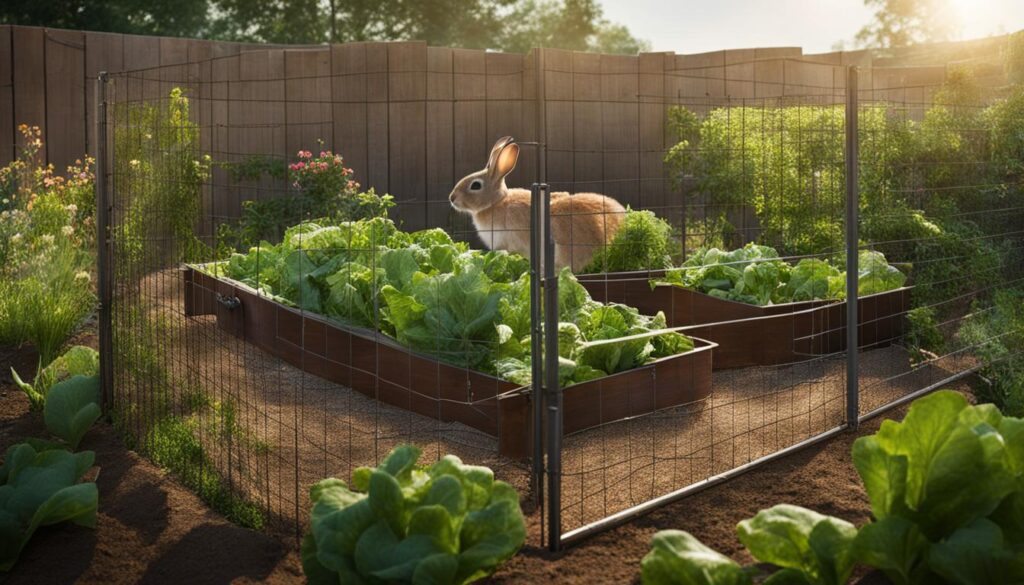Are rabbits wreaking havoc in your garden beds? Don’t worry, we’ve got you covered! In this article, we’ll show you the best techniques to protect your raised garden beds from those pesky rabbits. It all starts with the height of your garden bed, so pay close attention!
To safeguard your garden beds from rabbits, it’s crucial to consider the height of the bed. According to experts, the bed should be at least 24 inches or higher. This will prevent rabbits from jumping over and reaching your precious plants. But height alone might not be enough—adding barriers like barbed wire can provide extra protection and discourage rabbits from entering your garden.
Post Summary:- Ensure your raised garden bed is at least 24 inches high to keep rabbits out.
- Consider using barbed wire or other barriers to further deter rabbits.
- Don’t underestimate the importance of maintaining the appropriate height for your garden bed.
- Protecting your plants from rabbits now will save you a headache later on.
- By implementing these strategies, you can ensure a thriving garden bed free from rabbit damage.
Will a raised garden bed keep rabbits out?
When it comes to protecting your garden from rabbits, raised garden beds can be a useful tool. However, it’s important to understand that while raised beds can help deter rabbits, they do not guarantee that rabbits will stay away completely.
The effectiveness of a raised garden bed in keeping rabbits out depends largely on the height of the bed. If the bed is not raised high enough from the ground, rabbits may still be able to reach and eat your plants. Experts recommend that the bed should be at least 2 feet high to minimize the risk of rabbits jumping over and accessing the plants.
In addition to the height of the bed, it’s also important to consider other measures for effective rabbit control. Planting rabbit-resistant species in your garden can provide an added layer of protection. These plants have natural deterrents that make them less appealing to rabbits, reducing the likelihood of damage. Installing fences or other barriers around the garden can also help keep rabbits at bay.
Pros and Cons of Using a Raised Garden Bed for Rabbit Control
| Pros | Cons |
|---|---|
| Raises the height of the garden bed, making it more difficult for rabbits to access the plants | Does not guarantee complete protection; rabbits may still find ways to access the plants |
| Allows for better control over soil quality and drainage | Requires additional materials and labor to construct the raised bed |
| Provides a defined space for gardening, minimizing the risk of trampling and damage to plants | May not be suitable for all garden layouts and may require adjustments to accommodate specific needs |
While a raised garden bed can be an effective measure to deter rabbits from entering your garden, it should be combined with other methods for optimal results. By considering the height of the bed, planting rabbit-resistant species, and implementing additional barriers, you can create a garden that is less appealing to rabbits and better protected against their damaging habits.

Can rabbits crawl?
Rabbits can indeed crawl under specific circumstances. However, crawling is not a typical behavior for rabbits unless they have a strong motivation, such as the presence of food on top of a fence or in a raised garden bed. In general, rabbits are more inclined to attempt climbing if it serves their purpose. Therefore, if you are concerned about rabbits entering your garden, it is important to take preventive measures.
One effective way to deter rabbits is by planting rabbit-resistant plants. These plants have natural compounds or characteristics that make them less attractive to rabbits. Examples of rabbit-resistant plants include lavender, marigolds, and rosemary. By incorporating these plants into your garden, you can help minimize the risk of rabbits being enticed to crawl or climb into your garden bed.
Another deterrent is the installation of fences. A sturdy fence can act as a physical barrier that rabbits find difficult to crawl or climb over. Make sure that the fence is buried at least one foot into the ground to prevent rabbits from digging underneath. You can also consider extending the fence above the ground to discourage rabbits from attempting to jump over it.
Benefits of rabbit-resistant plants:
- Helps minimize the risk of rabbits entering your garden bed
- Natural deterrent without the need for harsh chemicals
- Provides additional visual appeal to your garden
Tips for installing a rabbit-proof fence:
- Choose a sturdy material, such as chicken wire or hardware cloth
- Bury the fence at least one foot into the ground to prevent rabbits from digging underneath
- Extend the fence above the ground to deter rabbits from attempting to jump over it
- Regularly inspect and maintain the fence to ensure its effectiveness
By implementing these strategies and considering the behaviors of rabbits, you can greatly reduce the chances of them crawling or climbing into your garden bed, ultimately protecting your plants from potential damage.

Can rabbits jump onto a raised garden bed?
While rabbits have the capability to jump over the edge of a raised garden bed, they usually prefer to dig holes underneath. This behavior makes it unlikely for rabbits to actually climb onto a raised garden bed. However, it is important to ensure that the raised garden bed or any surrounding barriers are at least 2 feet high, as rabbits can still jump if the height is not sufficient. By maintaining a suitable height for the bed, you can prevent rabbits from accessing your plants.
One effective way to deter rabbits from jumping onto a raised garden bed is by installing a physical barrier such as chicken wire or rabbit wire around the bed. This barrier should be at least 2 feet high to prevent rabbits from jumping over it. Additionally, consider burying the wire at least 1 foot into the ground to discourage rabbits from digging underneath. This combination of height and buried wire will make it challenging for rabbits to access your garden bed.
It’s important to note that rabbits are agile and can adapt to their surroundings. If they are highly motivated or desperate for food, they may attempt to overcome the barriers. To further enhance the protection of your raised garden bed, consider incorporating other rabbit deterrents such as planting rabbit-resistant species or using animal-repellent sprays. By combining these strategies, you can create a more formidable defense against rabbits and safeguard your plants.
Pros and Cons of Different Garden Bed Barriers
| Barrier Type | Pros | Cons |
|---|---|---|
| Rabbit Wire Fence | Effective at keeping rabbits out, allows for air and sunlight circulation | May require regular maintenance and repair, can be visually unappealing |
| Chicken Wire Cage | Provides a physical barrier against rabbits and other pests | Can be cumbersome to install and remove for maintenance |
| Electric Fence | Provides a strong deterrent against rabbits | Requires an electrical power source, may pose a risk to other animals or humans |
| Natural Barriers (plants, thorny bushes) | Blends well with garden aesthetics, provides additional benefits like flowers or fruits | May take time to establish and grow, requires regular pruning and maintenance |
It’s important to choose a garden bed barrier that suits your specific needs and preferences. Consider factors such as effectiveness, maintenance requirements, and visual appeal when selecting the right barrier for your raised garden bed. Regularly inspect and monitor the barrier to ensure its integrity and make any necessary repairs or adjustments to keep rabbits out.
How to keep rabbits away from your garden bed?
To effectively keep rabbits out of your garden bed, there are a few key strategies you can implement. One option is to construct a rabbit wire or chicken wire cage that fits around the bed. This can be done by building a frame using wooden or PVC pipe racks and covering it with wire or mesh of your choice. Adding a top to the structure can further prevent other animals from entering. Another method is to erect a chicken wire net around the garden bed by creating a fence around the perimeter and connecting the chicken wire to the fence. It is important to extend the wire at least 1 foot into the ground to prevent rabbits from digging underneath.
Using rabbit wire or chicken wire is an effective way to physically block rabbits from accessing your garden bed. These materials have small openings that prevent rabbits from squeezing through. However, it is important to regularly inspect the wire for any damage or gaps that may allow rabbits to enter. Make sure to repair any issues promptly to maintain the integrity of the barrier.
In addition to physical barriers, another approach is to use repellents to deter rabbits from your garden bed. There are various commercially available rabbit repellents that can be sprayed onto plants or applied around the perimeter of the bed. These repellents often have a scent or taste that rabbits find unappealing, thus keeping them away. It is important to follow the instructions on the repellent product and reapply as necessary, especially after rainfall.
DIY Rabbit Repellent Recipe
“Mix 1 tablespoon of hot sauce, 1 tablespoon of garlic powder, and 1 tablespoon of liquid dish soap with 1 gallon of water. Shake well and pour into a spray bottle. Spray the mixture onto your plants and the surrounding soil to deter rabbits.”
Remember that rabbits are persistent creatures, so it may be necessary to use a combination of different methods to effectively keep them away from your garden bed. By implementing physical barriers, using repellents, and regularly inspecting and maintaining the protection measures, you can significantly reduce the risk of rabbits damaging your plants.
| Method | Pros | Cons |
|---|---|---|
| Rabbit wire or chicken wire cage | – Provides a physical barrier – Can be customized to fit any garden bed size – Long-lasting and durable |
– Requires construction – May need occasional repairs |
| Chicken wire fence | – Easy to install – Provides a larger protected area – Can be combined with other fencing materials |
– Can be less visually appealing – Requires burying wire to prevent digging |
| Rabbit repellents | – Quick and easy to apply – Can be used on a variety of plants – Offers a non-physical solution |
– Needs regular reapplication – Some repellents may have a strong smell – May require multiple applications for effectiveness |
By choosing the most suitable methods for your garden bed and consistently applying them, you can create a protective barrier that effectively keeps rabbits away, allowing your plants to thrive.
What Are the Best Methods for Getting Rid of Rabbits in Raised Garden Beds?
Having trouble with rabbits invading your raised garden bed? Don’t worry! There are effective ways to remove raised garden bed rabbits. Start by installing a sturdy fence or wire mesh around your bed to keep them out. Consider using natural repellents like garlic or hot pepper spray. Another option is planting rabbit-resistant flowers and herbs, such as marigolds or lavender. Remember to trim back nearby vegetation that may attract rabbits too.
Conclusion
Protecting your raised garden beds from rabbits is crucial to ensure the health and growth of your plants. By considering the height of the garden bed and implementing appropriate barriers, such as rabbit wire or chicken wire cages, you can effectively deter rabbits from accessing your plants.
Additionally, planting rabbit-resistant species and removing potential hiding spots can further discourage rabbits from entering the garden. It is important to regularly inspect and monitor your garden to catch any signs of rabbit activity and take necessary actions to prevent damage.
With these strategies in place, you can enjoy a thriving garden free from the nuisance of rabbits. By maintaining the protection of your raised garden beds and implementing rabbit deterrents, you can safeguard your plants and create a beautiful and flourishing garden. Happy gardening!
FAQ
How high should a raised garden bed be to protect it from rabbits?
According to experts, the bed should be at least 24 inches or higher to keep rabbits out.
Will a raised garden bed prevent rabbits from accessing plants?
While raised garden beds can help deter rabbits, it does not guarantee that they will stay away. If the bed is not high enough from the ground, rabbits may still be able to reach and eat the plants.
Can rabbits crawl under barriers to access a raised garden bed?
Rabbits have the ability to crawl under certain circumstances, especially if there is food present on top of a fence or in a raised garden bed. However, in general, they do not crawl unless there is a specific reason to.
Can rabbits jump over a raised garden bed?
While rabbits have the capability to jump over the edge of a raised garden bed, they usually prefer to dig holes underneath. However, it is important to ensure that the height of the bed is at least 2 feet to prevent rabbits from accessing your plants.
How can I keep rabbits away from my garden bed?
To effectively keep rabbits out of your garden bed, you can construct a rabbit wire or chicken wire cage that fits around the bed. Another option is to erect a chicken wire net around the garden bed by creating a fence around the perimeter and connecting the chicken wire to the fence.
How can I protect my raised garden beds from rabbits?
Protecting your raised garden beds from rabbits is essential to preserve the health and growth of your plants. By considering the height of the garden bed and implementing appropriate barriers, such as rabbit wire or chicken wire cages, you can effectively deter rabbits from accessing your plants. Additionally, planting rabbit-resistant species and removing potential hiding spots can further discourage rabbits from entering the garden.









